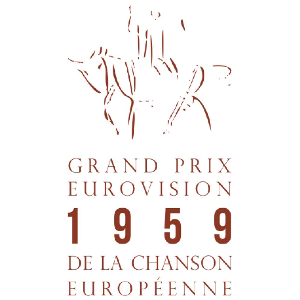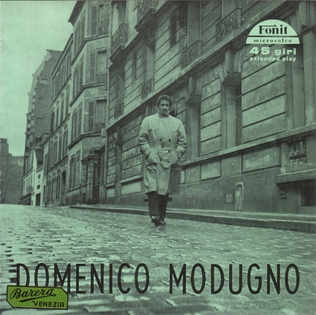
The Eurovision Song Contest 1959 was the fourth edition of the annual Eurovision Song Contest, held on Wednesday 11 March 1959 at the Palais des Festivals et des Congrès in Cannes, France, and hosted by French television presenter Jacqueline Joubert. Organised by the European Broadcasting Union (EBU) and host broadcaster Radiodiffusion-Télévision Française (RTF), the contest, originally known as the Grand Prix Eurovision de la Chanson Européenne 1959, was held in France following the country's victory at the 1958 contest with the song "Dors, mon amour", performed by André Claveau.
The United Kingdom participated in the Eurovision Song Contest 1960. The British Broadcasting Corporation (BBC) organised a national final, the Eurovision Song Contest British Final, to select the United Kingdom's entry for the contest. The United Kingdom was represented by the song "Looking High, High, High", performed by Bryan Johnson, and placed 2nd, the United Kingdom's joint best placing in the competition at the time.
The United Kingdom participated in the Eurovision Song Contest 1959. The British Broadcasting Corporation (BBC) organised a national final to select the United Kingdom's entry for the contest. The song selected was "Sing, Little Birdie", performed by Pearl Carr and Teddy Johnson. The song placed second in the contest, at the time the United Kingdom's best result in the competition, and remained so until their first victory in 1967.

Pearl Lavinia Carr and Edward Victor "Teddy" Johnson were English husband-and-wife entertainers who were best-known during the 1950s and early 1960s. They were the UK's Eurovision entrants at the 1959 contest with "Sing, Little Birdie", which came second.

Eurovision: You Decide is the most recent name of a BBC television programme that was broadcast annually to select the United Kingdom's entry for the Eurovision Song Contest. The show had previously gone under several other names, including Festival of British Popular Songs (1957), Eurovision Song Contest British Final (1959–1960), The Great British Song Contest (1996–1999), Eurovision: Making Your Mind Up (2004–2007), Eurovision: Your Decision (2008), and Eurovision: Your Country Needs You (2009–2010), but was known, for most of its history, as A Song for Europe.
Bryan Johnson was an English singer and actor.
Sweden's entry for the Eurovision Song Contest 2006 was Carola with the song "Invincible".

"Dors, mon amour" is a love song recorded by French singer André Claveau with music composed by Pierre Delanoë and French lyrics written by Hubert Giraud. It represented France in the Eurovision Song Contest 1958, held in Hilversum, resulting in the country's first win in the contest.

"'n Beetje", spelled in full as "Een beetje", is a song recorded by Dutch singer Teddy Scholten with music composed by Dick Schallies and Dutch lyrics written by Willy van Hemert. It represented the Netherlands in the Eurovision Song Contest 1959 held in Cannes, winning the contest. It was the second victory for the country in the first four years of the contest.

"Nous les amoureux" is a song recorded by French singer Jean-Claude Pascal with music composed by Jacques Datin and French lyrics written by Maurice Vidalin. It represented Luxembourg in the Eurovision Song Contest 1961 held in Cannes, resulting in the country's first ever win at the contest.
The Netherlands participated in the Eurovision Song Contest 2004 with the song "Without You" written by Ed van Otterdijk and Angeline van Otterdijk. The song was performed by the duo Re-union. The Dutch broadcaster Nederlandse Omroep Stichting (NOS) organised the national final Nationaal Songfestival 2004 in collaboration with broadcaster Televisie Radio Omroep Stichting (TROS) in order to select the Dutch entry for the 2004 contest in Istanbul, Turkey. 24 entries competed in the national final which consisted of six shows: four semi-finals, a wildcard round and a final. Ten entries qualified from to compete in the final on 22 February 2004 where "Without You" performed by Re-union was selected as the winner following the combination of votes from a five-member jury panel and a public vote.

"Piove " is a song with music composed by Domenico Modugno and Italian lyrics written by Eduardo Verde. It won first prize at the 1959 Sanremo Music Festival, where it was performed by both Modugno and Johnny Dorelli. It represented Italy in the Eurovision Song Contest 1959 held in Cannes, performed by Modugno and placing sixth.
The Netherlands participated in the Eurovision Song Contest 2007 with the song "On Top of the World" written by Tjeerd Oosterhuis, Martin Gijzemijter and Maarten ten Hove. The song was performed by Edsilia Rombley, who was internally selected by the Dutch broadcaster Nederlandse Omroep Stichting (NOS) to represent the Netherlands at the 2007 contest in Helsinki, Finland after previously representing the country in the Eurovision Song Contest in 1998 where she placed third with the song "Hemel en aarde". Edsilia Rombley's appointment as the Dutch representative was announced on 16 December 2006. Three potential songs were presented to the public on 11 February 2007 during the special programme Mooi! Weer het Nationaal Songfestival where the selected song "Nooit meer zonder jou" was announced. The song was later translated from Dutch to English for the Eurovision Song Contest and was titled "On Top of the World".
Sweden was in their second Eurovision Song Contest represented by Brita Borg with the song "Augustin". The winning song was elected in the Swedish national final: Melodifestivalen 1959. Eight semi-finals were held on the radio. During the semi-finals, Sveriges Radio decided that the winning song would represent Sweden at the Eurovision Song Contest 1959. The singer for Cannes had already been selected.
The Netherlands participated in the Eurovision Song Contest 2011 with the song "Never Alone" written by Jan Dulles, Jaap Kwakman and Jaap de Witte. The song was performed by the band 3JS, which was internally selected by the Dutch broadcaster Televisie Radio Omroep Stichting (TROS) to represent the Netherlands at the 2011 contest in Düsseldorf, Germany. 3JS' appointment as the Dutch representative was announced on 15 July 2010, while the national final Nationaal Songfestival 2011 was organised in order to select the song. Five songs competed in the national final on 30 January 2011 where "Je vecht nooit alleen" was selected as the winning song following the combination of votes from a five-member jury panel and a public vote. The song was later translated from Dutch to English for the Eurovision Song Contest and was titled "Never Alone".

"Running Scared" is a song performed by Azerbaijani duo Ell & Nikki –Eldar Gasimov and Nigar Jamal– with music composed by Stefan Örn, Sandra Bjurman, and Iain James Farquharson, and lyrics written by Örn and Bjurman. It represented Azerbaijan in the Eurovision Song Contest 2011 held in Düsseldorf, resulting in the country's only ever win at the contest.
Stanley Robert Butcher was a British pianist, composer, arranger and bandleader in the fields of jazz and easy-listening.
The Netherlands participated in the Eurovision Song Contest 2017 with the song "Lights and Shadows" written by Rory de Kievit and Rick Vol. The song is performed by the group O'G3NE, who was internally selected by the Dutch broadcaster AVROTROS to represent the Netherlands at the 2017 contest in Kyiv, Ukraine. O'G3NE's appointment as the Dutch representative was announced on 29 October 2016, while the song, "Lights and Shadows", was presented to the public on 3 March 2017.
"World Forum/Communist Quiz" is a Monty Python sketch, which first aired in the 12th episode of the second season of Monty Python's Flying Circus on 15 December 1970. It featured four icons of Communist thought, namely Karl Marx, Vladimir Lenin, Ché Guevara and Mao Zedong being asked quiz questions.








